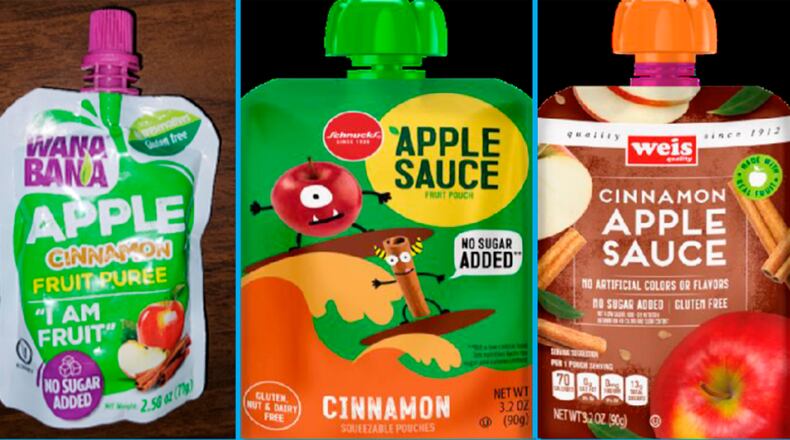This story has been updated on Feb. 27, 2024 to reflect the latest tally of confirmed or suspected cases of poisoning nationally and in Georgia as the investigation continues
The number of children sickened by high levels of lead in tainted applesauce pouches has continued to grow to 25 in Georgia.
The latest tally includes 15 confirmed cases, according to the latest figures from the Georgia Department of Public Health.
DPH spokeswoman Nancy Nydam told The Atlanta Journal-Constitution that there are also 9 probable cases and one suspected case. The total number of 25 cases is up from 20 cases in early January. An age breakdown of the Georgia cases was not available, but Nydam said most or all are children.
The recalled pouches — sold under three brands: WanaBana, Schnucks and Weis — have been linked to 422 confirmed or suspected illnesses in 44 states, primarily in children, according to the latest information available from the Centers for Disease Control and Prevention. Earlier this month, the Food and Drug Administration announced that Ecuadorian officials have identified a “likely source” of the lead contamination, but added that the U.S. agency can’t take any direct action against the supplier.
Cases of lead poisoning began appearing in late October and the products were recalled Nov. 9. Despite the recall, some of the products remained on the shelves of some Dollar Stores in the U.S. as recently as Dec. 19, according to the U.S. Food and Drug Administration.
Nydam said state health investigators are revisiting cases back to November 2022 — a year before the recall — and consulting with the parents of previous cases to see if the applesauce could be the cause of the poisoning.
Dr. Hugo Scornik, a pediatrician in Conyers who previously led the Georgia chapter of the American Academy of Pediatrics, said he thinks awareness of the poisoning is likely the biggest factor in new cases being reported so long after the recall was announced.
Lead can come from other environmental sources and can linger in the body, making finding the source of the poisoning more difficult. For children with high lead levels, an investigation is needed to rule out other causes. Most lead poisoning in children results from eating chips of deteriorating lead-based paint, according to the Mayo Clinic.
Scornik said most children poisoned by lead have no obvious immediate symptoms and a blood test is needed to determine whether a child has been poisoned. But even mild lead poisoning can cause learning problems later in life, he said.
There’s no safe level of lead exposure, and lead is particularly dangerous to children because their growing bodies absorb more lead than adults and their brains and nervous systems are more sensitive to the damaging effects of lead.
U.S. food inspectors found “extremely high” levels of lead in cinnamon at a plant in Ecuador that made the applesauce pouches, according to the FDA.
Cinnamon tested from the plant had lead levels more than 2,000 times higher than the maximum level proposed by the FDA, officials said. The samples tested came from ground or powdered cinnamon from Negasmart, an Ecuadorian company that supplied the spice to Austrofoods, which made the pouches.
In addition to the lead contamination, the FDA reported earlier this month they also found high levels of chromium in their testing of the recalled products. Chromium is an essential mineral found in foods and supplements, but some forms can be toxic at high levels. According to the agency, “Due to limitations in available testing methods, FDA was not able to definitively determine the form of chromium in the cinnamon apple puree sample.”
According to an update in the FDA’s investigation posted Feb. 6, Ecuadorian officials in Agencia Nacional de Regulación, Control y Vigilancia Sanitaria (ARCSA) have reported that Carlos Aguilera of Ecuador, the processor of the ground cinnamon supplied by Negasmart to Austrofoods and later used in recalled apple cinnamon products, is the likely source of contamination and is no longer in operation. The Ecuadorian officials said the unprocessed cinnamon sticks used in the recalled applesauce were sourced from Sri Lanka and were sampled by ARCSA and found to have no lead contamination. ARCSA’s investigation and legal proceedings to determine ultimate responsibility for the contamination are still ongoing.
The FDA stated it has limited authority over foreign ingredient suppliers who do not ship products directly to the U.S. and so can’t take direct action with Negasmart or Carlos Aguilera.
What should you do?
If you’re not sure if you or a member of your family has consumed the product, go to the FDA’s website for a full list of affected products.
Symptoms of lead toxicity can include headache; abdominal pain or colic; vomiting and anemia. Longer-term exposure could result in behavioral changes such as irritability; lethargy; difficulty concentrating, fatigue and weight loss.
There is no medicine that reverses the harm that has already occurred from lead poisoning and there is no specific antidote to treat chromium exposure.
If you suspect that you or your child may have been exposed to lead, you should talk to your healthcare provider about getting a blood lead test. Healthcare providers and most local health departments can test for lead in the blood. Many private insurance policies cover the cost of testing for lead in the blood. The cost of blood lead testing for children enrolled in Medicaid is covered by the Centers for Medicare & Medicaid Services.
Source: Centers for Disease Control and Prevention
About the Author
Keep Reading
The Latest
Featured


